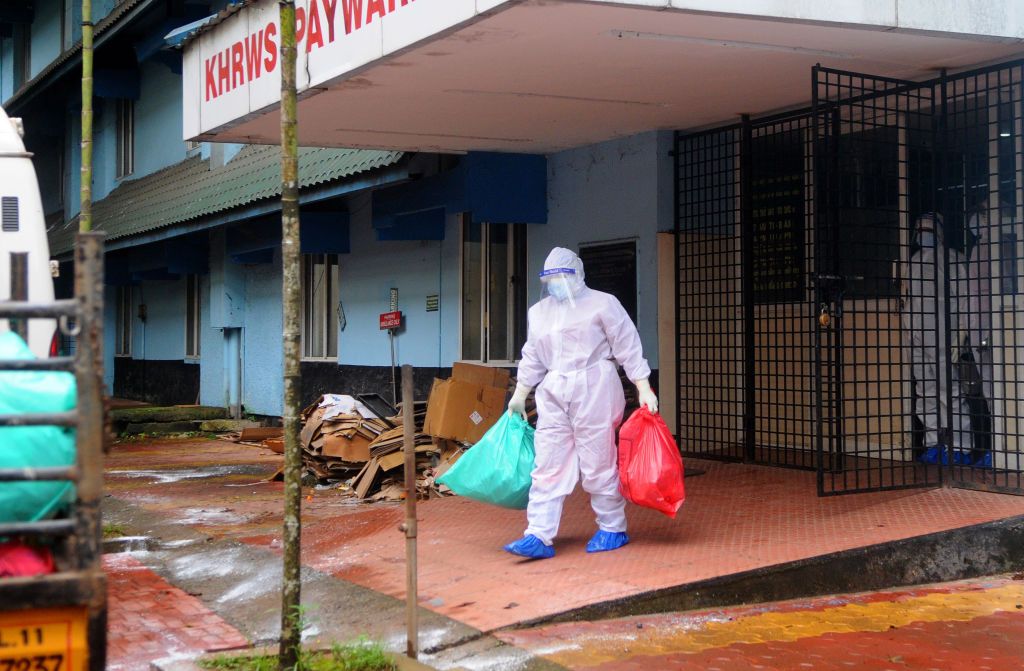By – Prakarsh Kastwar
Kerala’s government increased its efforts to prevent and control the spread of the Nipah virus.
The Kerala administration declared in the state assembly on Wednesday that the brain-damaging Nipah virus, which has killed two of the four persons affected, was a strain of the Bangladesh version that passes from person to person. According to Kerala Health Minister Veena George, the variation has a high fatality rate but is less contagious.
George verified that the virus was responsible for the recent “unnatural deaths” in the state’s Kozhikode region. According to Reuters, one of those infected with the virus died this month, while the other died on August 30.
This is Kerala’s fourth Nipah outbreak since 2018. When Kerala first reported the Nipah outbreak in 2018, 21 of the 23 affected people died. Nipah claimed two more lives in 2019 and 2021. There are no medicines or vaccinations available to combat the virus. The virus is transmitted to humans through direct contact with infected bats, pigs, or other people’s bodily fluids. It was initially identified in 1999 amid an outbreak of disease in Malaysia and Singapore affecting pig farmers and others in close contact with pigs.
The following are the most recent updates on the virus situation in Kerala :
- On Wednesday, teams from Pune’s National Institute of Virology (NIV) will fly into Kerala to set up a temporary lab at Kozhikode Medical College where they will conduct bat surveys and test for the Nipah virus.
- To conduct a survey, a team of epidemiologists from Chennai will also travel to Kerala.
- On Wednesday, Health Minister George announced a number of steps being taken to address a health crisis, including contact tracing, isolation facilities, delineating containment zones, and purchasing medicines from the Indian Council of Medical Research (ICMR) for those who are infected.
- Atanchery, Maruthonkara, Tiruvallur, Kuttiyadi, Kayakkodi, Villyapalli, and Kavilumpara are the seven village panchayats that the Kozhikode administration has designated as containment zones.
- Additionally, a warning has been issued for the Keralan districts of Malappuram, Wayanad, and Kannur.
- To supply the monoclonal antibodies needed to treat viral sufferers, the Indian Council of Medical Research (ICMR) has also agreed.
- People in containment zones have been instructed to use hand sanitizers, wear masks, and maintain a distance from one another.
- In a Facebook post on Tuesday, Kozhikode District Collector A Geetha stated that these places had been sealed off by the police and that nobody was permitted to enter or exit them until further notice.
- From 7 am to 5 pm, businesses providing necessities and medical supplies are permitted to operate inside the containment zones. The time limit is not necessary for pharmacies and health centers to operate, though.
- Village offices and local self-government institutions will run on the barest of employees. However, inside the containment zones, banks, other government agencies, educational institutions, and anganwadis won’t be operating. Geetha suggested that individuals use internet services rather than venture outside of their homes.
- Additionally, drivers of vehicles passing through containment zones on national highways have been instructed not to stop there.
- A group of medical specialists was despatched to Kerala by the central government. “I have spoken to the Kerala Health Minister. There have been reports of this virus several times this season,” said Union Health Minister Mansukh Mandaviya. This virus, which is spread by bats, is developing cases. In order for us to take safeguards, the Health Ministry has created a guideline.
- Pinarayi Vijayan, the chief minister, has also warned people to exercise caution. Everyone should completely adhere to the police and health department’s directions and totally cooperate with the limitations, he said.

